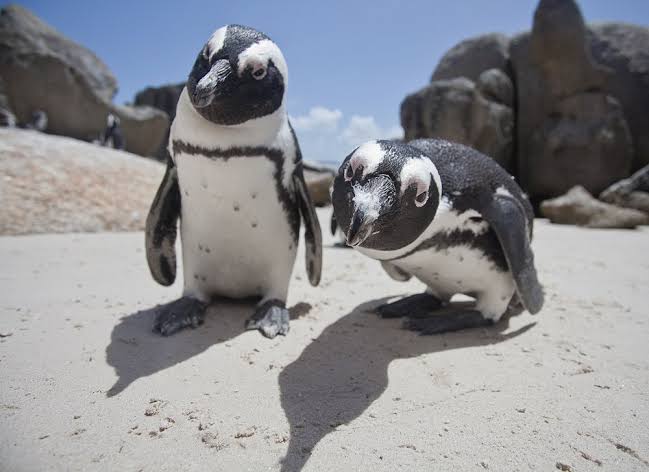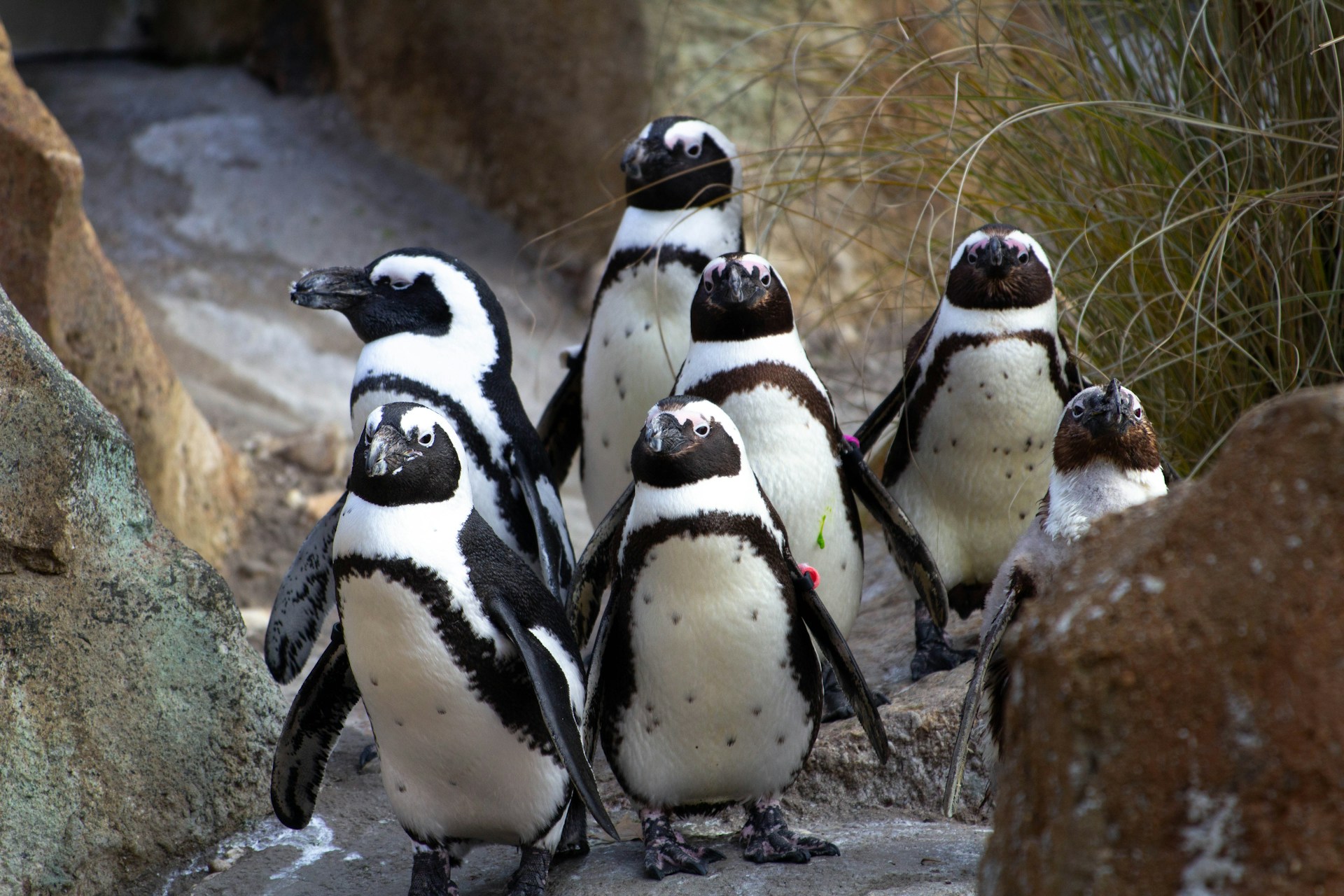African Penguins in Simon’s Town
Our Wildlife
Nestled in the charming coastal town of Simon’s Town, Cape Town, lies one of the most delightful wildlife encounters South Africa has to offer—the African Penguin.
If you’re planning a stay at Sea’scapes in Seaforth, our self-catering accommodation, you are in for a treat. Simon’s Town is a prime destination for observing these captivating creatures in their natural habitat. This article delves into the fascinating world of African Penguins, ensuring an unforgettable and informative visit.
What are African Penguins and Where are They From?
African Penguins, also known by their scientific name Spheniscus demersus, are a unique and fascinating species. These endearing birds are the only penguin species native to the African continent, making them a special highlight for wildlife enthusiasts visiting the region. Often referred to as “jackass penguins,” they are named for their distinctive braying call, which sounds remarkably like a donkey’s hee-haw.
These charming birds are primarily found along the southwestern coast of Africa, with significant colonies located in South Africa and Namibia. The most famous of these colonies is at Boulders Beach in Simon’s Town, but other colonies can be found on the offshore islands and coastal areas. African Penguins have adapted to the warmer climates of Africa, unlike their Antarctic relatives, making them an intriguing species to observe in their natural habitat.
Physical Characteristics
African Penguins are easily recognisable by their striking black and white plumage. This colouration serves a critical purpose: camouflage. The black feathers on their backs blend seamlessly with the dark ocean depths when viewed from above, while their white bellies merge with the bright sea surface when seen from below. This clever adaptation helps protect them from predators such as sharks and seals while they swim in the ocean.
These penguins have a robust and streamlined body, perfect for agile swimming. They can reach speeds of up to 20 km/h (12 mph) and dive to depths of over 60 metres (200 feet) in search of fish, squid, and crustaceans, which form the bulk of their diet. On land, they waddle endearingly but are also capable of climbing rocky outcrops and burrowing into the sand to create nests.


Are African Penguins Dangerous?
African Penguins are generally not dangerous to humans and are known for their curious and social nature. These charming creatures can often be seen waddling around in groups on the shore or swimming gracefully in the ocean, providing delightful entertainment for observers. Their playful behaviour and endearing appearance make them a favourite among tourists visiting Simon’s Town.
However, it is essential to remember that, like any wild animal, African Penguins should be treated with respect and observed from a safe distance. While they are not aggressive by nature, they do have sharp beaks which they can use defensively if they feel threatened or cornered. To ensure both your safety and the well-being of the penguins, it is important to follow some simple guidelines when observing these fascinating birds.
Understanding Penguin Behaviour
African Penguins are inherently inquisitive, and you might find them approaching you out of curiosity. While this can be an enchanting experience, it is vital to remain still and allow the penguins to explore without interference. If a penguin starts to bray loudly or display signs of agitation, such as flapping its wings vigorously or making rapid movements, it is best to back away calmly to give the animal space.
By respecting these guidelines, you can ensure a safe and enjoyable experience for both yourself and the penguins. Observing these delightful birds in their natural habitat is a privilege, and by following these simple rules, you contribute to the conservation of their environment and help protect them for future generations to enjoy.
Tips for Safe and Respectful Penguin Viewing:
- Maintain a Safe Distance: Always keep at least three metres away from the penguins. This helps prevent any accidental harm to the birds and ensures that you do not disturb their natural behaviour. Use binoculars if you want a closer look.
- Do Not Approach Too Closely: Avoid getting too close to the penguins or attempting to touch them. They might appear friendly and approachable, but sudden movements or close proximity can cause them stress and provoke defensive behaviour.
- Observe Quietly: Keep noise levels to a minimum when you are near the penguins. Loud noises can startle and distress them. Speaking softly and moving slowly will help you enjoy a more peaceful and authentic wildlife experience.
- Respect Their Habitat: Stay on designated pathways and boardwalks to avoid trampling on penguin nests or burrows. These areas are often marked to protect the penguins’ natural environment, ensuring they have a safe space to breed and raise their chicks.
- Avoid Feeding the Penguins: Feeding wild animals can disrupt their natural diet and behaviour, leading to health issues and dependency on human-provided food. Let the penguins forage for their own food in the ocean as nature intended.
- No Flash Photography: The flash from cameras can startle penguins and cause them distress. Opt for natural light when taking photos, and always check if photography is permitted in certain areas.
Where Can One Find African Penguins in Simon’s Town?
While Boulders Beach is renowned for its thriving penguin colony and is a must-visit destination for any traveller to Simon’s Town, there are several other less-crowded spots where you can enjoy the company of African Penguins. These locations offer unique and tranquil settings to observe these delightful creatures without the hustle and bustle of the more popular sites. If you are staying at Sea’scapes, our self-catering accommodation in Murdock Valley, these spots are just a short journey away and provide perfect opportunities for quieter, more intimate penguin encounters.
Seaforth Beach
Located adjacent to Boulders Beach and within 2 minutes walk from Sea’scapes, Seaforth Beach is an excellent alternative for those seeking a more peaceful penguin viewing experience. This picturesque beach is ideal for a leisurely picnic or a refreshing swim while enjoying the sight of African Penguins in their natural habitat. The beach is family-friendly, with calm waters and lovely sandy shores, making it a perfect spot for a relaxing day out. You can often see penguins wandering around the rocks or swimming close to the shore, providing wonderful photo opportunities.
Foxy Beach
Foxy Beach, part of the Boulders Penguin Colony, offers elevated boardwalks that allow for fantastic penguin viewing without disturbing their environment. These boardwalks provide an excellent vantage point to observe the penguins as they go about their daily activities, such as nesting, preening, and socialising. The well-maintained paths ensure that visitors can enjoy close-up views of the penguins while respecting their natural space. Early mornings or late afternoons are particularly good times to visit, as the penguins are most active during these periods.
Water’s Edge Beach
A hidden gem in Simon’s Town, Water’s Edge Beach is less commercialised and offers a serene setting to observe penguins, especially during early mornings or late afternoons. This secluded beach is not as well-known as Boulders Beach, providing a quieter and more relaxed atmosphere. The clear, calm waters and rocky outcrops make it an ideal spot for spotting penguins both on land and in the water. It is a perfect place for those who prefer a more solitary and contemplative experience, surrounded by the natural beauty of the coastline.
Enjoying Your Stay at Sea’scapes
Staying at Sea’scapes in Seaforth provides an ideal base for exploring these incredible penguin viewing spots. Our self-catering accommodation offers all the comforts of home, with stunning views of False Bay and easy access to the best attractions Simon’s Town has to offer. After a day of penguin watching, you can return to the tranquillity of Sea’scapes, where you can relax and unwind, surrounded by the natural beauty of the area.

Social Structure and Behaviour
African Penguins are social birds, often seen in large groups both on land and at sea. They breed in colonies, and during the breeding season, they form monogamous pairs, returning to the same partner year after year. They typically lay two eggs, which both parents take turns incubating. Once hatched, the chicks are cared for by both parents until they are ready to fend for themselves.